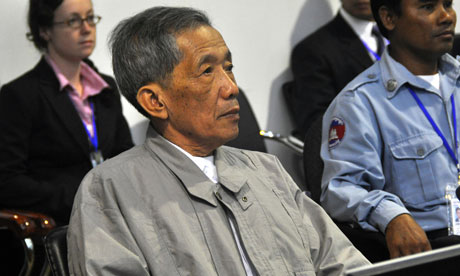 Duch, pictured in a Cambodian courtroom in Phnom Penh. Photograph: Ho/AFP/Getty Images
Duch, pictured in a Cambodian courtroom in Phnom Penh. Photograph: Ho/AFP/Getty ImagesA UN-backed Cambodian court's sentencing of the notorious Khmer Rouge executioner cracks criminals' culture of impunity
By Mark Vlasic
Read the original article at the guardian.co.uk,
Tuesday 13 March 2012
As many eyes in the world are turned towards the crisis in Syria, without much notice, Cambodia's UN-backed war crimes tribunal ended its first major trial, issuing a life sentence to 69-year-old Kain Guek Eav, or "Comrade Duch", a former Khmer Rouge's prison chief, for ordering and supervising the torture and murder of over 12,000 men, women and children at the regime's now-infamous Tuol Sleng (S-21) prison. And while the case has not made too many headlines, it serves as a reminder that war crimes trials are not just a fixture in Europe and Africa – but part of the legal landscape in Asia as well.
Like other war crimes trials throughout the world, those crimes prosecuted in Cambodia are gruesome. Thousands of innocents, allegedly including children as young as three, were detained, interrogated and tortured at S-21, the "factory of death", before Khmer Rouge members executed them at the "Killing Fields" nearby, and dumped their bodies in mass, unmarked graves.
Those murdered at S-21 were among the nearly 2 million Cambodians who died from starvation, disease, overwork, torture and execution during the Khmer Rouge's brutal rule from 1975-79. At trial, Comrade Duch admitted his role in the mass slaughter at S-21, but argued for acquittal, asserting that, as a second-tier official, he was only following orders. In rejecting Comrade Duch's defense, the court opined that his sentence of life imprisonment, "[reflects] the gravity of his crimes … [which were] undoubtedly among the worst in recorded human history."
The Cambodian court's final judgment highlights the important role that war crimes tribunals – and their tenacious prosecutors – have in slowly eliminating the culture of impunity that is so often associated with mass slaughters of humanity. Thanks to increased international cooperation, hardworking tribunal staff and the efforts of domestic governments, the past decade has seen the hand of justice come down on those once thought to be untouchable.
Looking back to the 20th century, few may have predicted that Slobodan Milosevic, Charles Taylor, Saddam Hussein, Radovan Karadzic, Ratko Mladić and Omar al-Bashir would have all been indicted for war crimes. But the fact that they have – and that someone like Comrade Duch has been found guilty of the atrocities that were committed in the 1970s – may support the presumption that the next generation of lawyers, prosecutors and foreign policy professionals may have the fortune of knowing a world in which high-level perpetrators are actually held accountable for their crimes.
Established with United Nations support in 2005, the "extraordinary chambers" in the courts of Cambodia were intended to bring senior, surviving leaders of the Khmer Rouge to justice, educate the young Cambodians about the regime's heinous crimes, and offer a the nation a chance to heal from the havoc wrought upon it in the 1970s. Both Cambodian and international judges sit on the tribunal, which is set to close in 2015.
Prosecutors are currently making the case against three senior, surviving Khmer Rouge officials: President Khieu Samphan, chief propagandist Nuon Chea, and foreign minister Ieng Sary. They are accused of crimes against humanity, war crimes, genocide, enslavement, imprisonment, torture, persecution and murder – just to name a few. But a stronger push for international justice is not shared by everyone.
Cambodian Prime Minister Hun Sen has publicly insisted the tribunal should end its operations after the trial of the three officials, and that further trials "will not be allowed". The prime minister claims the tribunal threatens to split the country, and may be harmful to national security. Some attribute the prime minister's opposition to his former role as a Khmer Rouge regimental commander, and suggest his actions may be further motivated by his will to shield political allies from possible indictment.
Such open opposition to the tribunal has frustrated many. Late last fall, one of the tribunal's international judges resigned and left a vacancy on the court. The resigning judge claimed the government's opposition to the tribunal interfered with the court's ability to investigate crimes and bring perpetrators to trial. The Cambodian government has recently come under UN fire for its failure to fill the vacancy with a reserve judge. The internal struggles, resulting from government opposition, have led not only to media accusations of inefficacy, but also threaten to halt the slow trend of accountability.
Despite the challenges the court faces, the United Nations continues to stand behind the tribunal and its mission. The international community is also working garner Cambodian support for the tribunal: the US and British governments, and the East-West Center, televised Comrade Duch's trial, likely in the hope of educating the nation about atrocities committed by the Khmer Rouge, and the effectiveness of war crimes tribunals.
It's unclear whether the court will convict the three top officials currently on trial – or indict more senior Khmer Rouge members. Nevertheless, the tribunal's recent judgment – and its indictment of Khieu Samphan, Nuon Chea, and Ieng Sary – demonstrate that even domestic political impediments cannot halt the downward trend of impunity, nor impede the long arm of justice. Comrade Duch's conviction may have come more than 40 years after the fall of the Khmer Rouge, but the successful prosecution proves that, though delayed, the world will not stand for justice denied.

No comments:
Post a Comment